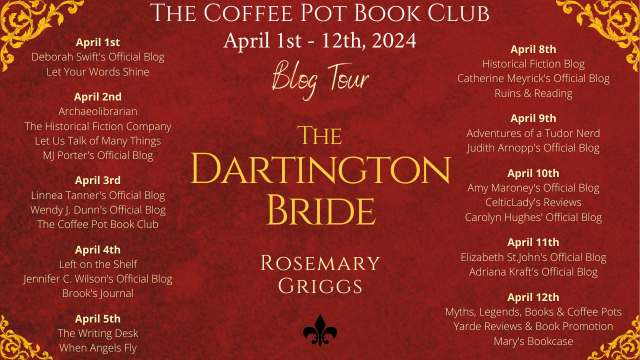
02 Apr Rosemary Griggs The Dartington Bride #HistoricalFiction #Devon #Elizabethan #FrenchWarsOfReligion #BlogTour #TheCoffeePotBookClub @RAGriggsauthor @cathiedunn
FEATURED AUTHOR: ROSEMARY GRIGGS
I‘m delighted to host Rosemary Griggs as the featured author in The Coffee Pot Book Club Blog Tour being held between April 1st – 12th, 2024. Rosemary Griggs is the author of the Historical Fiction, The Dartington Bride (Daughters of Devon) by Troubador Publishing on 28th March 2024 (368 pages)
Below are highlights of The Dartington Bride, Rosemary Griggs’ author bio, and her fascinating guest post about what inspired her to write The Dartington Bride.
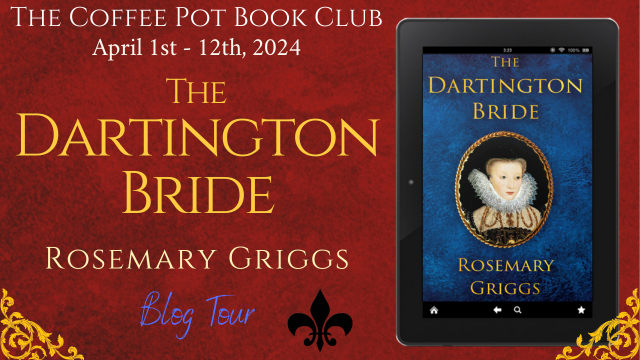
Tour Schedule Page: https://thecoffeepotbookclub.blogspot.com/2024/02/blog-tour-the-dartington-bride-by-rosemary-griggs.html
HIGHLIGHTS: THE DARTINGTON BRIDE
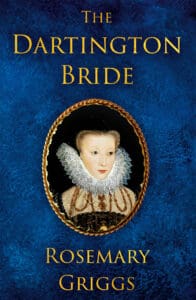
The Dartington Bride
(Daughters of Devon)
By Rosemary Griggs
Audiobook narrated by Rosemary Griggs
Blurb:
1571, and the beautiful, headstrong daughter of a French Count marries the son of the Vice Admiral of the Fleet of the West in Queen Elizabeth’s chapel at Greenwich. It sounds like a marriage made in heaven…
Roberda’s father, the Count of Montgomery, is a prominent Huguenot leader in the French Wars of Religion. When her formidable mother follows him into battle, she takes all her children with her.
After a traumatic childhood in war-torn France, Roberda arrives in England full of hope for her wedding. But her ambitious bridegroom, Gawen, has little interest in taking a wife.
Received with suspicion by the servants at her new home, Dartington Hall in Devon, Roberda works hard to prove herself as mistress of the household and to be a good wife. But there are some who will never accept her as a true daughter of Devon.
After the St Bartholomew’s Day Massacre, Gawen’s father welcomes Roberda’s family to Dartington as refugees. Compassionate Roberda is determined to help other French women left destitute by the wars. But her husband does not approve. Their differences will set them on an extraordinary path…
Buy Links:
Universal Buy Link: https://rosemarygriggs.co.uk/books/2/The%20Dartington%20Bride/
AUTHOR BIO: ROSEMARY GRIGGS
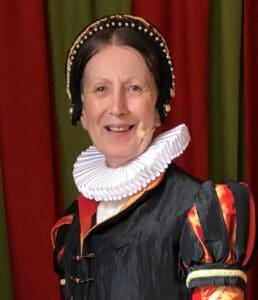
Author and speaker Rosemary Griggs has been researching Devon’s sixteenth-century history for years. She has discovered a cast of fascinating characters and an intriguing network of families whose influence stretched far beyond the West Country and loves telling the stories of the forgotten women of history – the women beyond the royal court; wives, sisters, daughters and mothers who played their part during those tumultuous Tudor years: the Daughters of Devon.
Her novel A Woman of Noble Wit tells the story of Katherine Champernowne, Sir Walter Raleigh’s mother, and features many of the county’s well-loved places.
Rosemary creates and wears sixteenth-century clothing, a passion which complements her love for bringing the past to life through a unique blend of theatre, history and re-enactment. Her appearances and talks for museums and community groups all over the West Country draw on her extensive research into sixteenth-century Devon, Tudor life and Tudor dress, particularly Elizabethan.
Out of costume, Rosemary leads heritage tours of the gardens at Dartington Hall, a fourteenth-century manor house and now a visitor destination and charity supporting learning in arts, ecology and social justice.
Author Links:
Website:https://rosemarygriggs.co.uk/
Twitter: https://twitter.com/RAGriggsauthor
Facebook: https://www.facebook.com/ladykatherinesfarthingale
Instagram: https://www.instagram.com/griggs6176/
Threads: https://www.threads.net/@griggs6176
Bluesky: https://bsky.app/profile/ragriggsauthor.bsky.social
Amazon Author Page: https://www.amazon.com/stores/Rosemary-Griggs/author/B09GY6ZSYF
Goodreads: https://www.goodreads.com/author/show/21850977.Rosemary_Griggs
GUEST POST: THE INSPIRATION FOR MY NOVEL THE DARLINGTON BRIDE
BY ROSEMARY GRIGGS (23 MARCH 2024)
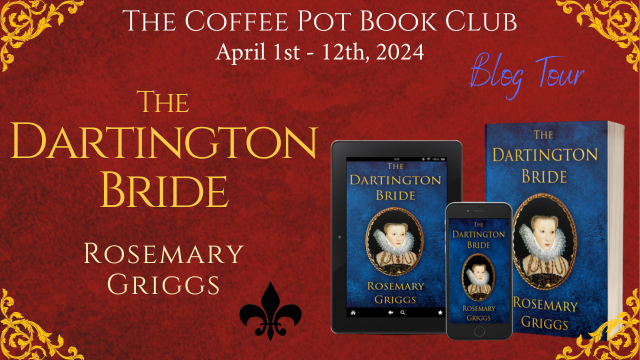
I love Tudor history and I’m as a fascinated by the lives of King Henry’s queens and Elizabeth the First as anyone. But the sixteenth century saw an immense upheaval in the social, religious, and political structure of England. Everyone was affected, not just those at the royal court. Exploring how the well-known events and all the changes they ushered in impacted the lives of others is the underlying inspiration for my writing. Setting out to discover what it felt like to live through those times, I’ve made it my mission to uncover the lives of less well-known aristocratic women.
My novels follow the lives of real people from Devon’s most powerful families. For years, I’ve been researching those families and uncovering a network of fascinating individuals. A lot of the men are famous, larger-than-life personalities. Devon produced a regiment of famous Elizabethan seafarers, adventurers and soldiers like Drake, Hawkins, Raleigh and Grenville. Their stories are often told. In my ‘Daughters of Devon’ series I tell the women’s stories.
The historical record is always my starting point. I’m on the lookout for a character and a set of circumstances or events that prompt me to ask questions like ‘What motivated that action?’ ‘How did it feel to be there on that day?’ ‘How did she cope?’ I’m interested in women who faced and overcame challenges during those turbulent Tudor years. Lady Gabrielle Roberta Montgomery ticked lots of boxes.
I first came across her when I was researching for my first novel, A Woman of Noble Wit, which was inspired by Katherine Champernowne, Sir Walter Raleigh’s mother. Lady Gabrielle, known as Roberda, married Gawen, who was Katherine’s nephew. The young Huguenot woman who left her home and family in 1571 to come to England caught my attention. The more I discovered, the more I wanted to know.
When she was very young, Roberda must have enjoyed a lavish lifestyle, living primarily in Paris close to the royal court. Her father, Gabriel de Lorges, later Count of Montgomery, was captain of the king’s Scots guards, an elite bodyguard.
In 1559, Gabriel became famous after accidentally killing King Henry II of France during a jousting match. After the accident, everything was different. Gabriel left France to travel to the Channel Islands and Venice before arriving in England in the spring of 1561. Roberda and her brothers and sisters lived a quiet life at Ducey in Normandy with their mother, the formidable Isabeau. When Gabriel returned, he adopted the Protestant religion and became a Huguenot military leader, causing yet another transformation in the family’s life.
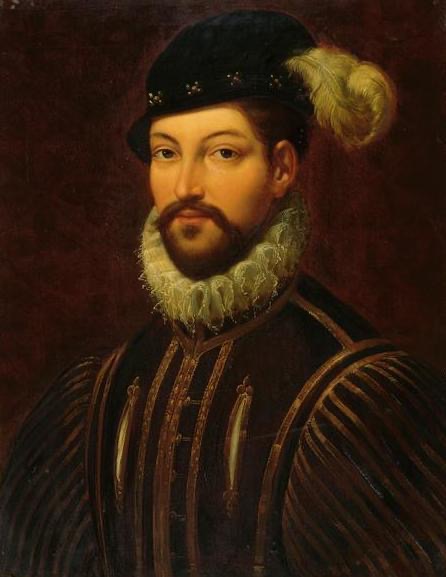
Gabriel de Lorges, Comte de Montgomery, Copy from an original kept at the Château de Beauregard;
commissioned by Louis-Philippe in 1834 — In the public domain, sourced via Wikimedia Commons
If Isabeau, Roberda’s mother, was a woman from Devon, I would definitely be writing about her. She was among the determined Normandy women who embraced Calvinism and gave active support to their menfolk amidst the destructive religious wars that tore the country apart. Isabeau wrote letters to Normandy noblemen and even to the queen of England, seeking to raise money and support for the cause. It was when I found records that told me that Isabeau took all of her children with her into the heart of the Siege of Rouen in 1562 that I knew I had to tell Roberda’s story. What she witnessed in the very heart of battle must have had a profound effect on the little girl. In my version of the story Roberda’s own experience of war translates into deep compassion for others affected by conflict or poverty.
As a woman of the French nobility, Roberda would have expected to marry to bring an advantage to her family. Understanding how these women embraced their lack of agency in marriage can be challenging when viewed from the perspective of the twenty-first century. However, they were raised to believe in it from birth and probably perceived a successful marriage as a ‘career’. Roberda undoubtedly anticipated leaving her home and family when she got married. As things turned out, she also had to leave the country of her birth and venture to another, where she faced an uncertain reception.
Gabriel hoped to secure financial and military aid for the Huguenot cause from Queen Elizabeth. He had met Sir Arthur Champernowne, a staunch protestant, when he first came to England. In 1568, Sir Arthur’s nephew, Henry Champernowne, persuaded Queen Elizabeth to let him lead a troop of English soldiers to aid the Protestants in France. A young Sir Walter Raleigh was almost certainly among them, Henry and his men fought bravely at the battle of Jarnac where the Huguenots were defeated. He saved many lives at the retreat from Montcontour. Henry succumbed to disease in La Rochelle in 1570. At that time, Sir Arthur and his son Gawen were providing information on French affairs to Queen Elizabeth’s top advisors, William Cecil (Lord Burghley) and Sir Francis Walsingham.
Sir Arthur had strong links to Queen Elizabeth’s court. Katherine Astley, his sister, served as Queen Elizabeth’s childhood governess and Chief Lady of the Privy Chamber. It’s no wonder that Gabriel de Lorges recognised the advantage of arranging a marriage between his daughter, Roberda, and Sir Arthur’s son. After long negotiations, they reached an agreement on a substantial dowry and Roberda arrived in England. After the unprecedented violence of the St Bartholomew’s Day massacre in Paris in 1572, Sir Arthur welcomed the whole family at Dartington Hall as refugees.
A significant wave of French refugees arrived in England as a result of the tragic events in Paris. I was curious to discover how these early Protestant refugees were welcomed by the English. It was surprising to discover the striking similarities in the challenges faced by asylum seekers today. Initial sympathy for their plight often turned to distrust and hostility, and a perception that they took jobs from English workers. The reception Roberda may have faced and opposition to her attempts to help others inspired my version of her story.
I also found some shocking papers about Roberda’s life in England. I don’t want to give away any spoilers, but things take an unexpected turn.
To find these intriguing events played out in one of my favourite historic sites in the whole of Devon, added another dimension. I’ve known Dartington for years, but it was a revelation to be allowed a peep ‘behind the scenes’ to discover echoes of the house in Sir Arthur’s time. A ghost story handed down through generations of the Champernowne family added another slant to my telling of Roberda’s story.
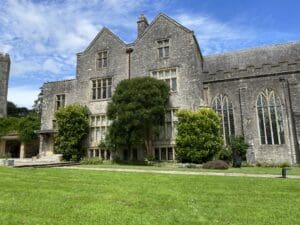
Dartington Hall, Devon
Queen Elizabeth I had a complicated relationship with France. She gave spasmodic, and often surreptitious, support to the Protestants there, while also courting good relations with the French royal family. I do not delve into high politics in my story. They are merely part of the backdrop. I keep the focus on the strong, compassionate and determined young woman who inspired me to write The Dartington Bride.
Roberda has been a constant part of my life as I’ve developed her story. Recently, I read a collection of inspiring works by the late Dame Hilary Mantel. In one article, she describes how, when working on Wolf Hall, Tudor Lawyers followed her as she walked in a garden. In a similar way, Roberda has been at my side. At times, her mother Isabeau joins her and insists on getting my attention. Exploring the relationship between these two strong women was fascinating. Sometimes I’ve also found a character from my first book tugging at my elbow. Katherine Raleigh wants to make sure I don’t forget that she was there during the events at Dartington Hall. I allow her to creep into the narrative now and then.
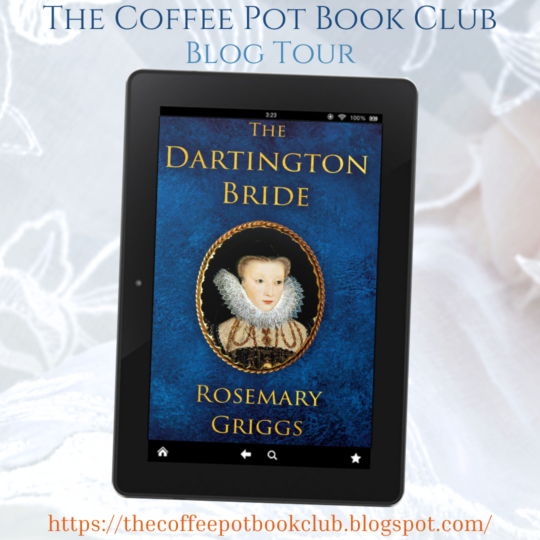
 Instagram Handle: @thecoffeepotbookclub
Instagram Handle: @thecoffeepotbookclub


Cathie Dunn
Posted at 05:30h, 03 AprilThanks so much for hosting Rosemary Griggs today, with such a fascinating guest post.
Take care,
Cathie xo
The Coffee Pot Book Club
Linnea Tanner
Posted at 10:05h, 03 AprilHi Cathie–It was my pleasure to host Rosemary Griggs and learn more about her and the inspiration for “The Dartington Bride.”